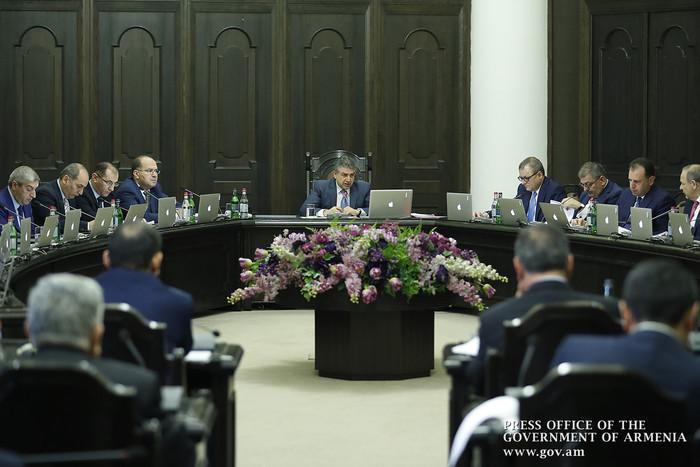With the presentation of the RA Minister of Finance Vardan Aramyan, the Executive approved the Draft Decision of the RA Government “On Making Amendments to the Decision N161 of the Government of the Republic of Armenia dated April 11, 2000”.
While presenting the draft decision, the RA Finance Minister Vardan Aramyan stressed that the draft was developed based on the opinion of the private sector.
To clarify and ease the procedure, it is offered hereafter to consider as capital expenditures all those expenses that comprise more than 5 percent of the initial value of the main funds. This would make the activities of economic entities significantly easier.
With the presentation of the Minister, the Executive approved the Draft Decisions of the RA Government “On Making Amendments and Supplements to the Law of the Republic of Armenia “On the Budgetary System of the Republic of Armenia” and “On Making Amendments to the Law of the Republic of Armenia “On Public Debt”.
Vardan Aramyan noted that the International Monetary Fund had provided technical assistance for the development of new fiscal rules.
According to the Minister, the key problem is that the current legal regulations in terms of fiscal rules are rather rigid.
The Minister said that according to the Law “On Public Debt”, if it exceeds 50 percent of the GDP, the next year’s budget deficit should be designed to be not more than 3 percent of the previous three year’s average GDP. In case of exceeding 60 percent, the debt is considered as void. According to Aramyan, this approach is rather strict. Many countries change these norms; they mainly put the rules in the expenditure policy: Armenia tries to do the same.
“We have mentioned three thresholds: if the debt is more than 40 percent, the norm that the country’s capital expenditures should be more than the deficit would work; if more than 50 percent, it is needed to toughen the conditions and to put a rule on current expenses growth; and if the public debt exceeds 60 percent, besides the above-mentioned restrictions it is necessary to conjoin current expenditures with own revenues, especially with tax revenues”, - clarified the Minister.
Talking on the RA Draft Law “On Making Amendments and Supplements to the Tax Code” presented by himself, the RA Minster of Finance Vardan Aramyan mentioned that the approval of the bill is conditioned by the necessity of separate legal norms review before the Tax Code’s full entry into force.
The bill offers, particularly in terms of dividend taxation: to tax the dividends declared by only the general meeting of shareholders, removing the tax occurrence norm on June 30 of each year; to tax the dividends occurred from the distribution accumulated profits occurred in 2017 and subsequent reporting periods in case of non-resident physical entities; to tax the dividends occurred from the distribution accumulated profits occurred in 2018 and subsequent reporting periods in case of resident physical entities; to consider either interest-free or low-interest loans as dividend payments in the sense of tax legislation not to avoid tax payment; etc.
In terms of minimal profit tax, it is offered not to annul the amount of minimal profit tax allowing to reduce the minimal profit tax in case of occurrence of positive difference between the actual amount of profit tax and the prepayment of profit tax of that year without any deadlines.
The bill also offers to restore the privilege of exemption from the VAT for the sphere of inbound tourism; to clarify the capital expenditure recognition criteria; to consider as capital expenditures the expenses containing material costs or not containing them and made more than a certain percentage on an annual basis; as well as it is offered to reduce the possibility of repaying the interest rate of mortgage loans at the expense of profit tax to some extent directing it to the middle and low income classes. According to the bill, this opportunity will not cover the transactions of AMD 55 million and more, as well as in the case of acquiring the second property by a borrower or a co-borrower.







